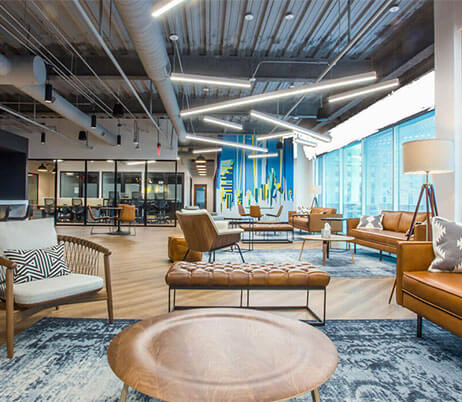Who knew that in 2005, when Brad Neuberg coined the term “coworking space” for his shared office space in San Francisco, coworking spaces would literally change the face of “the office” as we know it. In the beginning, coworking spaces were populated mostly by tech startups and hipster entrepreneurs and were generally thought of as a trend that would lose its popularity as companies matured and grew out of these spaces. However; just the opposite seems to be happening. With over 35,000 flexible workspaces in the world today, all sizes and types of businesses are preferring the coworking space model over the traditional office status quo.
Established companies have been getting into coworking in a big way
As data began to show, individuals and small businesses preferred to work in flexible, shared spaces where networking, collaboration and productivity are standard fare, complete with everything they needed to conduct business each day. Then established brands started using coworking spaces for their remote teams and as satellite offices, in lieu of shelling out an exorbitant amount of money to lease or build regional offices. Now, corporations are finding ways to incorporate the flexible workspace into their office environments, renting whole floors of buildings and even entire buildings from a coworking spaces, as their new headquarters. Established businesses benefit from coworking spaces in many other ways, such as:
1. Real estate and other expenses
Coworking spaces are changing the landscape of real estate sales in major urban areas, such as New York, Los Angeles and Chicago, to name a few. Many larger, well-established companies are opting for the enterprise level in coworking spaces to save money, rather than leasing a commercial space and outfitting it with business machines, equipment and the technology you need to keep growing. Not only that, some coworking spaces, such as Venture X, offer design-forward spaces with upscale furnishings and other refined appointments, that would cost most companies a considerable amount to design, source and install in their own spaces.
2. Flexibility
Established businesses may need more room to grow as they expand and take on more talent. While outgrowing your original space is one of the best problems companies can have, moving to a new location can disrupt business, taking your talent’s focus off the core business objectives in the course of your move. At most coworking spaces, with no lengthy leasing contracts to deal with, companies can expand in place, renting more desks or offices for personnel, as needed, or more floors or another building. Coworking spaces allow your staff to work in larger spaces and still benefit from the atmosphere and energy that make these flexible spaces so popular.
3. Social interaction—Meeting and getting to know people outside of your industry helps spark creative ideas that can generate fresh ideas. Also, taking a break during the work-day and interacting with your coworking community helps build connections to your local business community, as well. The informal educational events hosted by most coworking spaces can incubate new relationships that would otherwise never happen.
4. Closer to innovative ideas—Established companies can benefit from new ideas that can help them keep an edge on their competition. Because talent in large companies is focused on implementing current initiatives, they might not be in the loop with new ideas and technology. By working in a coworking space, established companies can keep young innovators close by for inspiration and possibly turn them into team members down the road
5. Built-in talent pool—Hiring staff can be a long, exhausting process, resulting in taking chances on personnel and personalities you don’t actually know will resonate with your company chemistry. When you work around other professionals, from other businesses, you get a chance to see people in action and get a feeling for how someone, right under your nose could be the right fit for your business. By the same token, when expanding your company, you may need to hire a website designer to update your online image, plus photographers, content writers and other independent marketing professionals to help with your new image. No need for stress, with marketing and creative business pros in your coworking community ready to help.
6. Built-in clients—Likewise, with a diverse community representing many industries in coworking spaces, chances are you will attract clients from the roster of other members. Building a list of satisfied customers from your coworking community will add even more exposure to your brand as these clients recommend your company to others in their business and personal communities.
7. Community managers and amenities—Behind the seamless office experience of flexible working spaces, community managers are hard at work, making sure you have everything you need to work each day. From simply providing coffee, tea and filtered water all day long to coordinating catering, speakers and equipment needed for a networking event, community managers eliminate the need for companies to focus on support and maintenance needed at a traditional office.
All in all, when you look at the real estate cost savings for established companies, as well as the expense and labor needed to set up an office with all the appropriate equipment, a coworking option for established companies can be quite beneficial. Factoring in the intangible benefits that coworking spaces engender, along with the real savings these spaces offer established brands, the wave of the future looks like blending the structure of traditional offices with the appeal of coworking spaces. At the Enterprise level, Venture X, is dedicated to helping you expand your established company. Contact us to schedule a tour!


